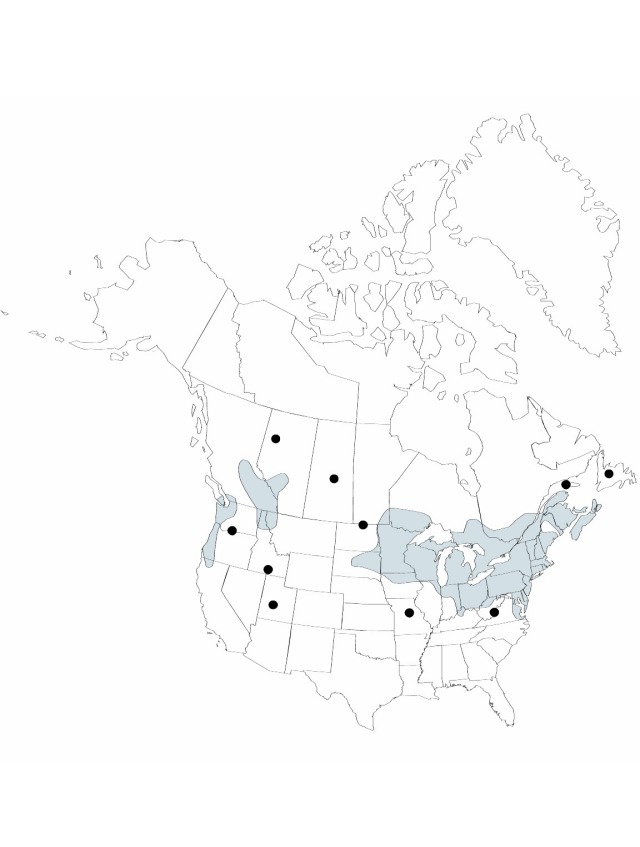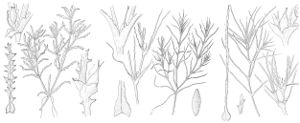Difference between revisions of "Najas flexilis"
Flora Sedinensis 382. 1824.
FNA>Volume Importer |
FNA>Volume Importer |
||
| Line 14: | Line 14: | ||
|name=Najas caespitosus | |name=Najas caespitosus | ||
|authority=(Maguire) Reveal | |authority=(Maguire) Reveal | ||
| − | }}{{Treatment/ID/Synonym | + | }} {{Treatment/ID/Synonym |
|name=Najas. canadensis | |name=Najas. canadensis | ||
|authority=Michaux | |authority=Michaux | ||
| Line 32: | Line 32: | ||
|elevation=0–1500 m | |elevation=0–1500 m | ||
|distribution=Alta.;B.C.;Man.;N.B.;Nfld. and Labr. (Nfld.);N.S.;Ont.;P.E.I.;Que.;Sask.;Calif.;Conn.;Del.;Idaho;Ill.;Ind.;Iowa;Ky.;Maine;Md.;Mass.;Mich.;Minn.;Mo.;Mont.;N.H.;N.J.;N.Y.;N.Dak.;Ohio;Oreg.;Pa.;R.I.;S.Dak.;Utah;Vt.;Va.;Wash.;W.Va.;Wis.;Eurasia. | |distribution=Alta.;B.C.;Man.;N.B.;Nfld. and Labr. (Nfld.);N.S.;Ont.;P.E.I.;Que.;Sask.;Calif.;Conn.;Del.;Idaho;Ill.;Ind.;Iowa;Ky.;Maine;Md.;Mass.;Mich.;Minn.;Mo.;Mont.;N.H.;N.J.;N.Y.;N.Dak.;Ohio;Oreg.;Pa.;R.I.;S.Dak.;Utah;Vt.;Va.;Wash.;W.Va.;Wis.;Eurasia. | ||
| − | |discussion=<p>In habit, Najas flexilis is most similar to N. guadalupensis. When seeds are present, N. flexilis can be separated easily from the latter species by the glossy, smooth, yellowish seeds that are widest above the middle. In the northern United States and in Canada, N. flexilis is by far the most common species of Najas, although in the Ohio and surrounding areas, it is disappearing as eutrophication (depletion of oxygen from lakes) continues (W. A. Wentz and R. L. Stuckey 1971).</p> | + | |discussion=<p>In habit, <i>Najas flexilis</i> is most similar to <i>N. guadalupensis</i>. When seeds are present, <i>N. flexilis</i> can be separated easily from the latter species by the glossy, smooth, yellowish seeds that are widest above the middle. In the northern United States and in Canada, <i>N. flexilis</i> is by far the most common species of <i>Najas</i>, although in the Ohio and surrounding areas, it is disappearing as eutrophication (depletion of oxygen from lakes) continues (W. A. Wentz and R. L. Stuckey 1971).</p> |
|tables= | |tables= | ||
|references={{Treatment/Reference | |references={{Treatment/Reference | ||
| Line 59: | Line 59: | ||
|publication year=1824 | |publication year=1824 | ||
|special status= | |special status= | ||
| − | |source xml=https://jpend@bitbucket.org/aafc-mbb/fna-data-curation.git/src/ | + | |source xml=https://jpend@bitbucket.org/aafc-mbb/fna-data-curation.git/src/8f726806613d60c220dc4493de13607dd3150896/coarse_grained_fna_xml/V22/V22_168.xml |
|genus=Najas | |genus=Najas | ||
|species=Najas flexilis | |species=Najas flexilis | ||
Revision as of 16:56, 18 September 2019
Stems often profusely branched distally, 2.5–5 cm × 0.2–0.6 mm; internodes 0.16–6.8 cm, without prickles. Leaves spreading to ascending with age, 0.2–0.6 cm, lax in age; sheath 0.7–1.6 mm wide, apex rounded; blade 0.2–0.6 mm wide, margins minutely serrulate, teeth 35–80 per side, apex acute, with 1–2 teeth, teeth unicellular; midvein without prickles abaxially. Flowers 1(–2) per axil, staminate and pistillate on same plants. Staminate flowers in distal axils, 1.1–2.7 mm; involucral beaks 3-lobed, 0.7–1.2 mm; anther 1-loculed, 1.1–2.7 mm. Pistillate flowers in distal to proximal axils, 2.5–4.7 mm; styles 1.5–1.7 mm; stigmas 3-lobed. Seeds not recurved, deep brown to yellow, narrowly to broadly obovoid, (1.2–)2.5–3.7 × 0.2–1.2 mm, apex with style situated at center; testa glossy, 3 cell layers thick, smooth; aeroleareoles regularly arranged in ca. 50 longitudinal rows, not ladderlike, 3–4-angled, longer than broad, end walls not raised. 2n = 12, 24.
Phenology: Flowering summer–fall.
Habitat: Lakes and rivers
Elevation: 0–1500 m
Distribution

Alta., B.C., Man., N.B., Nfld. and Labr. (Nfld.), N.S., Ont., P.E.I., Que., Sask., Calif., Conn., Del., Idaho, Ill., Ind., Iowa, Ky., Maine, Md., Mass., Mich., Minn., Mo., Mont., N.H., N.J., N.Y., N.Dak., Ohio, Oreg., Pa., R.I., S.Dak., Utah, Vt., Va., Wash., W.Va., Wis., Eurasia.
Discussion
In habit, Najas flexilis is most similar to N. guadalupensis. When seeds are present, N. flexilis can be separated easily from the latter species by the glossy, smooth, yellowish seeds that are widest above the middle. In the northern United States and in Canada, N. flexilis is by far the most common species of Najas, although in the Ohio and surrounding areas, it is disappearing as eutrophication (depletion of oxygen from lakes) continues (W. A. Wentz and R. L. Stuckey 1971).
